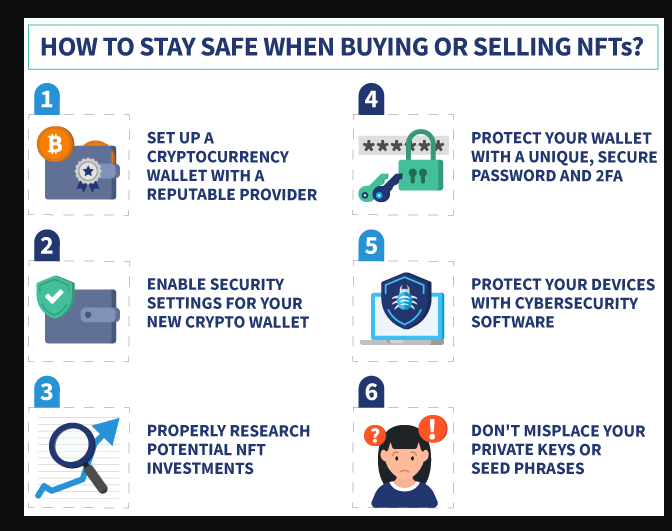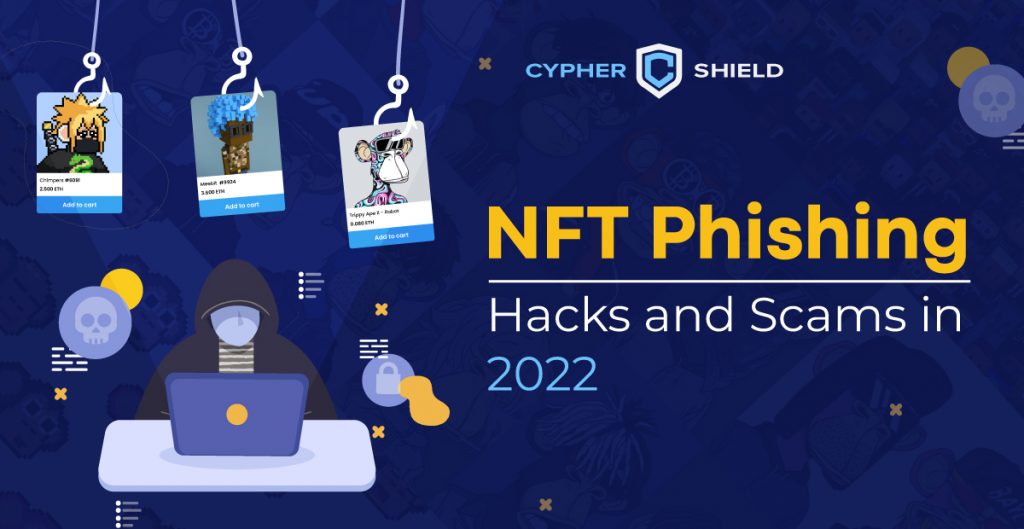NFTs are popular these days because they allow artists and content creators to sell their NFT collections for thousands of dollars. NFT trades totaled $17 billion, a 21,000% increase over the previous year. Regrettably, the boom has also attracted a deluge of NFT scams. These scams and NFT phishing hacks can cause you to lose your NFTs or render them worthless in an instant.
As the NFT market expands, fraudsters devise new methods to separate NFT creators from their hard-earned digital assets. The problem with NFT scams is that they are constantly evolving, and you may not know what to do to protect your digital assets. This blog will discuss the five NFT phishing hacks in 2022 as well as precautionary measures.
What is the NFT Phishing Scam ?
Phishing is an extremely popular method for obtaining sensitive user data. Login information, passwords for accessing funds, seed phrases, and other details may be included. Phishing links are distributed via emails, texts, or websites that impersonate information from an official entity.
Many people are easily duped into disclosing their personal information because they do not ask the questions. As a result, the success rate of phishing attacks increases dramatically.
5 Most Phishing Attacks On NFTs In 2022
1. OpenSea Hack
Early this year, the world’s largest NFT marketplace, OpenSea, was hacked and lost $1.7 million in Ether. Phishing links were sent to Opensea users, requesting that they migrate NFTs into their accounts. The contract included the attacker’s address and phone number, which the phished user agreed to sign. This allowed the tokens to be transferred into malicious contracts, draining the assets from the victim’s wallet.
2. BAYC hack
Hackers breached BAYC’s official Instagram page in April 2022 and circulated fake airdrop links, resulting in a $40 million loss. The hackers gained access to the official BAYC account by using a fake airdrop link. The NFT enthusiasts provided their metamask information, which drained the ape NFTs’ wallets.
3. Beeple Phishing hack
The artist behind the most expensive NFT artwork seen on a daily basis has a history of NFT phishing attacks, which resulted in a $438,000 loss. After impersonating the artist Beeple’s Twitter account, he shares a link to a fake NFT collection with his followers. The link then drained the users’ wallets of crypto and NFT.
4. Seth Green phishing link hack
Due to a privacy breach in his account, American actor Seth Green lost his NFT collection worth more than $60,000.
5. Deekay Kwon Phishing Link Hack
DeeKay Kwon’s hack followed a phishing attack pattern similar to Beeple’s. The hacker made $150,000 from multiple victims by posting a phishing link on the DeeKay account.
The Most prevalent NFT scams

1. Fake NFTs
There have been a number of reports of people selling fake or counterfeit NFTs. In some cases, the seller may be unaware that the NFT is a forgery. In other cases, the seller may be intentionally attempting to defraud people by selling counterfeit NFTs.
2. Scams Based on Phishing
Since NFTs are frequently purchased and sold online, scammers have begun to use phishing scams to attempt to steal people’s NFTs. A phishing scam involves a scammer sending an email or message that appears to be from a legitimate NFT platform or website.The message will usually include a link to a spoof website designed to look like the real thing. When the victim enters their login information on the fake website, the scammer gains access to their account and can steal their NFTs.
3. Ponzi schemes
NFTs have also been used in Ponzi schemes, which are illegal investment schemes that promise high returns but only pay out to early investors with funds raised from new investors. Ponzi schemes are frequently run by fraudulent companies that claim to be involved in the NFT market but are really out to steal people’s money.
4. Counterfeit NFTs
There are counterfeit NFTs, just as there are counterfeit physical items. These are NFTs that were created by replicating another NFT. They are typically created without the permission of the original NFT creator and are frequently sold at a fraction of the price. Counterfeit NFTs are quite often of lower quality than genuine NFTs, and they may not work with all NFT platforms.
5. Pump-and-dump schemes
In a pump-and-dump scheme, fraudsters often disseminate false or misleading information to create a buying frenzy, “pump” up the price of a stock, and then “dump,” selling their own shares at the elevated price.
6. Impersonation on social media
Social media impersonation is a type of digital identity theft. A cybercriminal or fraudster creates a profile on a social platform using personally identifiable information (name, photo, location, and background information) stolen from a specific person.
Tips to Avoid NFT scams

- Be wary of high-return promises
- Never reveal your private keys to anyone
- Make use of a reputable NFT marketplace
- Keep your NFTs in a safe wallet
Measures to Prevent NFT Security Issues
The increasing number of NFT phishing scams and attacks highlights the importance of asset protection. There are some precautions that people can take to avoid becoming victims of the most lucrative thefts.
- Avoid clicking on links shared in emails and on social media platforms. Always contact the official platform to confirm giveaways or updates.
- Maintain separate email accounts for each of the NFT marketplaces so that your information is not centralized in one place.
- Although it is convenient to perform gasless executions offline, you do not allow blind signatures due to the risk of a security breach.
- If you allow off-chain signatures, be careful when approving token permissions.
To wrap it all up,
NFTs are a new and exciting technology, but they have also become a target for scammers. There are numerous NFT scams to be aware of, and the best way to avoid them is to be vigilant and conduct thorough research. If something seems too good to be true, it probably is. So, use a trusted NFT marketplace and keep your NFTs in a secure wallet. By following these guidelines, you can help avoid becoming a victim of an NFT scam.

